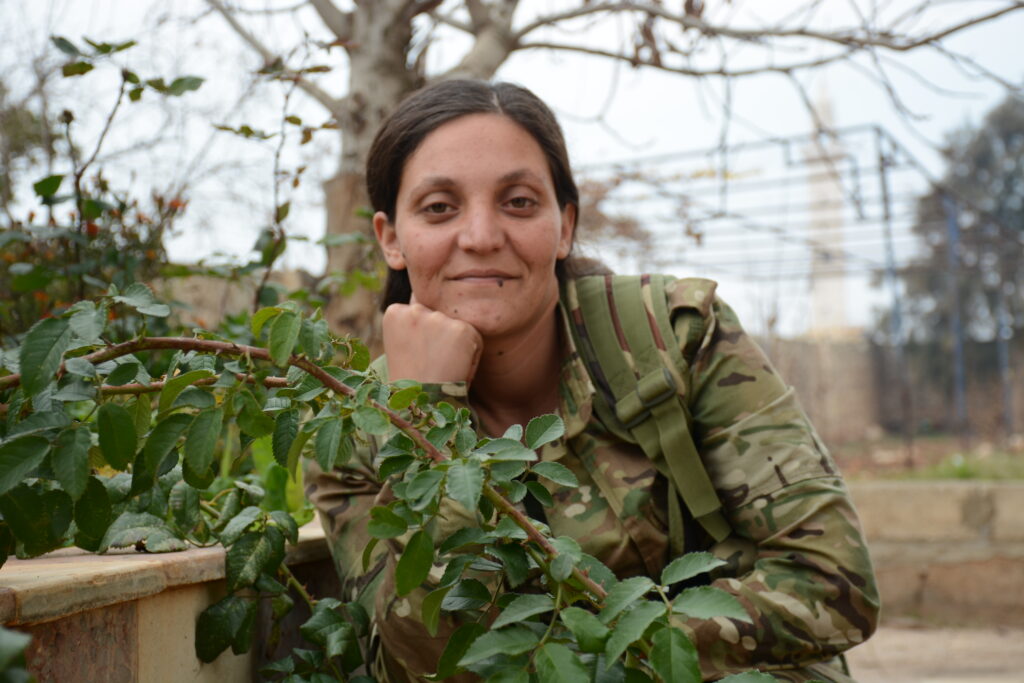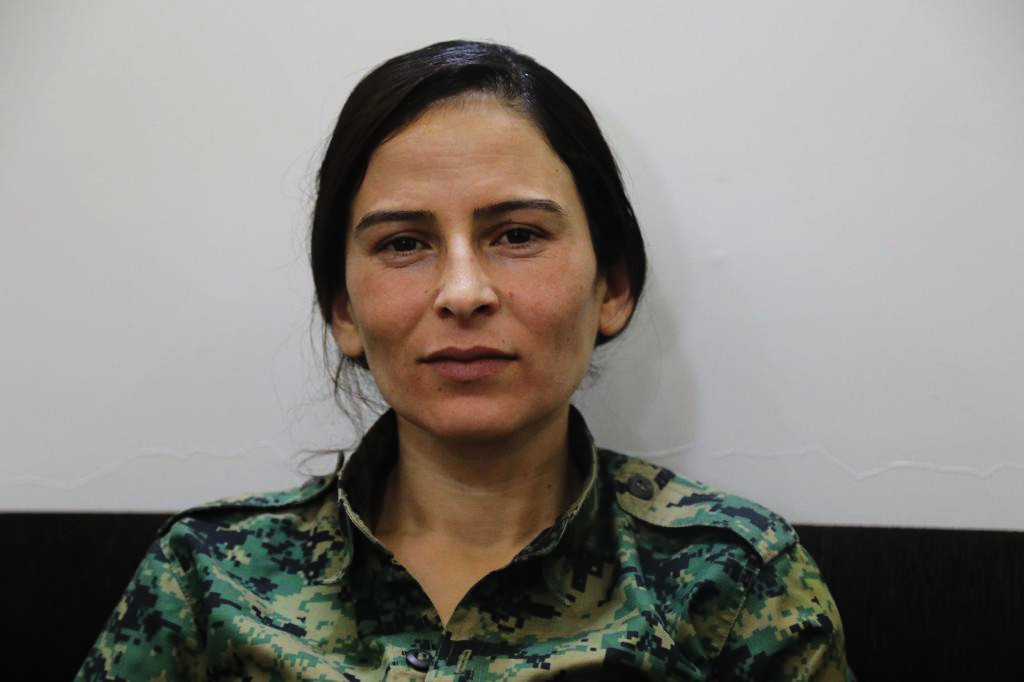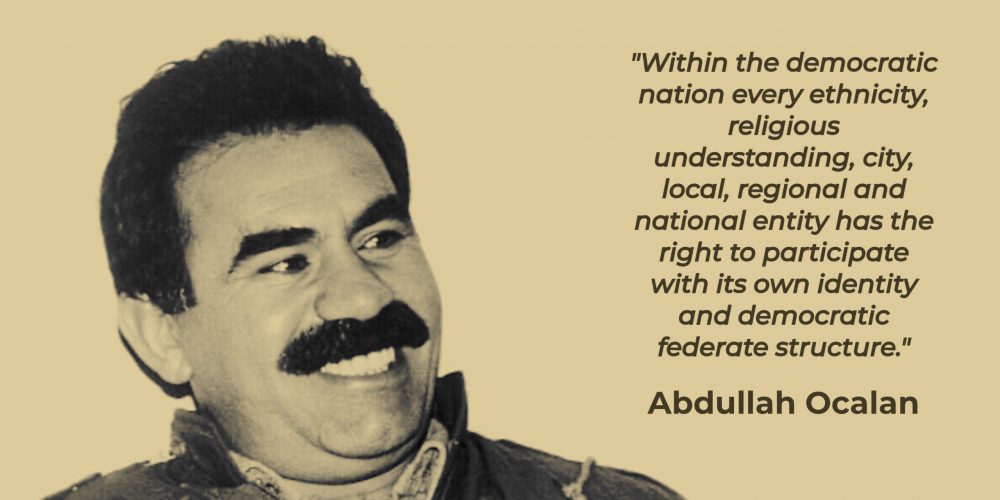An alternative built against the system of monopolies and nation states
“The definition of a democratic nation that is not bound by rigid political boundaries, one language, culture, religion and interpretation of history, signifies plurality and communities as well as free and equal citizens existing together and in solidarity. The democratic nation allows the people to become a nation themselves, without resting on power and state, becoming a nation through much needed politicisation. It aims to prove that not only through politicisation but also, in the absence of becoming a state or acquiring power, a nation can be created with autonomous institutions in the social, diplomatic, and cultural spheres as well as in economy, law and self-defence, and thus build itself as a democratic nation.”
Abdullah Ocalan
In Rojava a revolution is happening on the basis of a long term struggle of the people, it started more than ten years ago, and since then the life of society has fundamentally changed. One of the aspirations of this revolution is to propose a solution for the Kurdish Question, for the problems of the Middle East, and for a democratic transformation in general. It has been achieved by the continued struggle of the people and, at its core, by the liberation struggle of women. It has been recognized worldwide by democratic movements and individuals. In those years the society has changed a lot and it is always important to understand those transformations. One of the core issues that the Middle East faces today is how to overcome the politics of oppression, assimilation, and genocide: a solution to those problems ultimately also means building an alternative to the nation-state system. The centralization of the nation state is linked to the development of capitalism, because capitalism centralizes power in monopolies and intensifies fanatical ideas of nation-hood to an end point that inhibits diversity. In his writings, Abdullah Ocalan criticizes the positivist mentality that approaches any phenomenon in a strictly analytical way – an approach opens the way to genocidal politics when it comes to the question of nations. At the same time, he criticizes attitudes that limit their understanding of the problem of nationhood to a purely constructed or theoretical phenomenon. Instead, he emphasizes the necessity to analyze the problem, its historical roots and its systematics. To overcome it, he proposes the paradigm of the Democratic Nation, which clarifies that, first and foremost, the aim of society is to develop morally and politically. The struggle to achieve this transformation, subsequently, involves women’s liberation and developing an ecological way of life. It means overcoming the mentality of dividing everything into parts. Instead of the nation state, Abdullah Ocalan proposes the creation of a common life and self-administration for all ethnicities, religions and societal groups present in the region that, at the same time, offers everyone the opportunity to keep their autonomy and self-define their lives. Because women have been the strongest transformative force in the revolution and because their approach is very flexible and open-minded, they have managed to be the pioneers of overcoming national, ethnic, and religious boundaries. In North and East Syria the paradigm of the democratic nation is developing in practice. It was our struggle as YPJ that opened the way for this change. Inside the ranks of our forces, women from all kinds of religious and ethnic backgrounds take part, educate themselves about the paradigm of a democratic nation, and organize according to it. For many, this has meant great personal changes of attitude and has truly transformed the backward mindsets that we have all been raised with to some greater or lesser degree. Practically, this has become a reality today: a big part of the YPJ consists of Arabic women and women of Christian, Yazidi or other origins. They all organize in order to live out the truth of their own identities and to commonly struggle for freedom. We can see this in the brave personalities of young women today. They overcome the burdens of traditions and capitalist nation-states and create alternatives. We have met several of our friends in the YPJ who are going through this process. That have taken up roles in the self-defense of their common homeland, in units of heavy weapons, in operation forces, in the media, and in the organization of the revolutionary people’s war. But first and foremost, they took on the responsibility to change themselves and society. To show this, we have interviewed four of them. Every one of them represents a part of the YPJ’s lived reality and history.
1.

My name is Axin Bahoz. I was born in 1999 in Tirbespiyê (Al-Qahtaniyah) to a family that comes from Iraq but moved to Syria many years ago. We are Muslims. Our tribe is the Igêdate. My mother died when I was a child, and I grew up with my father and my stepmother. Growing up, I saw a lot of violence against women, and this was very difficult for me. As it was still a tradition in Arab society, I was married off while still a minor. My husband and I got into fundamental disagreements because we did not love each other. After my husband was killed in an airstrike, I had to return to my own family. After some time, they wanted to marry me again to another man, but I couldn’t agree to this. I ran away from home and joined the women’s defense forces. I faced so many difficulties growing up, because I was without my mother. I grew up exposed to the violence of my father and his second wife.
I used to know a woman from the YPJ who was later martyred, and she would always speak about freedom and the importance of women’s self-organisation. She also spoke about the meaning of true friendship and how it feels to live with so many women together in a women’s organization, taking a stance and having an opinion. This is why I joined the YPJ in 2017 and attended my first education. My experience at this education strengthened my desire to stay with the YPJ, and in my first year of 2018 I changed very rapidly as I began to discover myself. In this environment, I developed a free opinion, developed willpower, and learned about my history. I analyzed the influence of society on my personality as a woman a lot, and the more I learned about myself the more I realized that there was still to learn. Seeing women take up arms and defend themselves had a great impact on me as a result.
The project of a democratic nation is fundamental for us as YPJ, and it is this project that has transformed our society. We are living together with friends with many different national identities. We are fighting together on the basis of the thought of Abdullah Ocalan, who developed the project of the democratic nation. We have truly become one. This is new for the YPJ and also for the society. Under the policies of nation-states, those in power try to make people hate each other. But as we became educated about the project of Abdullah Ocalan, we learned to feel, understand, and support each other. There are fighters from all over Kurdistan, Internationalists, Arabic, Syriac and Armenian members, and we are all struggling together and with each other in order to produce a society of free women. We struggle to ensure that women can gain their rights, that they can learn about the philosophy of a free life, and that we can communally live together. We also learn about each other’s cultures. Sometimes we might have difficulties, but the biggest reason for this is that we do not properly analyze how the enemy is playing with our minds. As our education continued we finally understood some of these things. At first, we might have said, “How should we be able to live together?”, but after some time, education and discussion, we saw that the project of democratic nation is excellent for us. There are difficulties, but with education, they can be overcome.
In our struggle as the YPJ there have been friends from all backgrounds that have truly influenced me. For example, Ruken Zerdeşt was a Yazidi woman who had a great influence on me. She believed a lot in our success. She thought a lot about the philosophy of Abdullah Ocalan and the freedom of women. When she talked about it, her eyes were sparkling and full of determination. She really believed in victory. She went to Afrin to struggle against the occupation forces. When she was martyred, she exploded herself in order not to fall into the hands of the enemy.
I joined the YPJ to liberate myself and to be able to live as my true self. I look back on the history of women, and today we can clearly see that our ideas are spreading among the women of the world. Today, women have gained an opinion, taken up weapons, fought, lived in equality and seen that real justice is within reach. Because we proved that these things are possible, thousands of women have joined the YPJ. The ones that came to the YPJ had the chance to free themselves from the hands of oppressive manhood and learn to be their true selves. This proved to all the world that women can do anything and that they are not condemned to a life at the service of some family. It was shown that women can live a free and just life. We could only reach this day because of Abdullah Ocalan’s thoughts and the early struggles of the women’s movement. The enemy wants to break women because they understand that women are the main backbone of society. But the struggle for women continues and has become even more intense than before. I have undoubtedly made mistakes, but in general, I have a great belief in this struggle and am convinced to go on and continue on this line no matter the difficulties. It is important for women to acquire this knowledge and act on it.
2.
My name is Hêlîn. I grew up in Tirbespî in North and East Syria, but my family comes from Aleppo, which is the second-largest city in Syria. I joined the ranks of the Women’s Protection Units (YPJ) in 2016. My family didn’t want me to do so. I think that the reason my father didn’t want me to join the self-defense forces is because I am a woman, and this stems from the mentality of the society that we live in. This society is still immersed in the patriarchal mentality that has controlled us for thousands of years. My father wasn’t angry in the same way when my two brothers joined the SDF. As I saw the development and the struggle of the YPJ and YPG and the lives of the fighters, I decided to join the ranks of the YPJ. I saw how fast the YPJ grew at the beginning of the revolution and the determination with which the women were struggling.

The time of the Battle of Kobani influenced me a lot. The liberation of Kobani proved the capability of the YPJ fighters. We faced the largest terrorist organization, ISIS. I joined in battles, we had to use a variety of tactics. We struggled within the framework of legitimate self-defense. We were the first female army to confront ISIS. Between us as members of YPJ there is truly a strong friendship that binds us together in difficult times. This kind of life and ethical attitude have always attracted the attention of Arab women. Thanks to the women’s movement and the Rojava Revolution, life was constantly changing, developing and opening up. The revolution also influenced the institution of the family itself. Relationships started to be built on mutual respect and appreciation because barriers that were created by the mentality of the state system were broken.
I was curious to know the truth about the Kurdish people and why Abdullah Ocalan, the leader, was in prison. Why was Kurdistan not recognized globally? What is this libertarian, ecological and democratic model in Rojava? These and many other questions were looming in my mind, and I started to look for the answers to them. Today, I am interested to learn more about the thoughts of this movement because these thoughts are enough to build a bright future. This is truly what I was looking for, and I am still continuing to search. As we know, the YPJ is waging an international struggle and has become a society for itself, which includes Kurds, Arabs, Persians, Armenians, Turkmen and many others. Abdullah Ocalan stresses in his thoughts that women’s freedom is the basis for building a free society, a free mentality and a future based on coexistence. Our revolution is the revolution of free women. We seek to create a strong fighting personality that will be a vanguard force and a free and just democratic society. Revolutionary women do not bend, no matter the cost, because women’s character is one of will and strength. Abdullah Ocalan laid the foundation to the struggle of women to become revolutionary, warrior of freedom that cannot be shaken by the wind and rejects oppression.
I was asking myself: “what would my revolutionary personality be like? What is a free life?” This requires me to develop morals, a just personality and political knowledge. Life cannot be measured by an authoritarian mentality. Our lives require a spirit of responsibility and a scientific, philosophical and ethical approach. Abdullah Ocalan proposes that we develop an intellectual and organized personality as women. We have to create our principles for life. It is the approach of his philosophy that gives us trust and self-confidence to develop our personalities. It strengthened our effectiveness and ability to develop and liberate women from all traditions. This itself is a very beautiful struggle. The way to achieve change is through fundamental criticism of our backward personality traits that are formed by oppression.
The project of a democratic nation is a project of a common life created by Abdullah Ocalan. It opposes all forms of oppression and the state itself. It is a solution to the Kurdish question by seeing it as a core issue of the democratization process in Syria in general. The Kurdish question is not separate from the Syrian issue. It would be difficult to solve the problems in Syria in general and for Syria to emerge from the current crisis without solving the Kurdish question. This leads Abdullah Ocalan to the concept of the Democratic Nation. The Democratic Nation represents a modern alternative within which society is formed. This is a nation based on diversity and its democratic self-administration, not limited by geography or language.
Abdullah Ocalan began his struggle for the freedom of the Kurdish people after they had been subjected to terrible injustice by the ruling regimes and states. As a result of his deep analysis of history and the region and by seeing the society of the Middle East, he understood that most people were oppressed, so his project became to embrace all peoples, not just the Kurds. The democratic nation, as a project that emerged from the philosophy of Abdullah Ocalan is a solution for the oppressed peoples and a solution to all the outstanding issues that the Middle East faces. For this reason, people followed his path. It has become clear that the project of the democratic nation is not welcomed by the capitalist forces and states because it struggles to free society from oppression. Consequently, it also stands in sharp opposition to colonialism. This is the reason why so many countries participated in the international conspiracy against Abdullah Ocalan, that led to his arrest on February 15, 1999. This complot was carried out by Turkey, but in the interest of capitalist forces that are afraid of the third line that his thoughts propose.
The people of North and East Syria were able to implement the project of a democratic nation through democratic self-administration. An administration in which women participate equally, with the method of the co-chair system. Women organize themselves without a ruler or tyrant giving instructions. Arab women have been able to prove themselves in all areas of this revolution.


